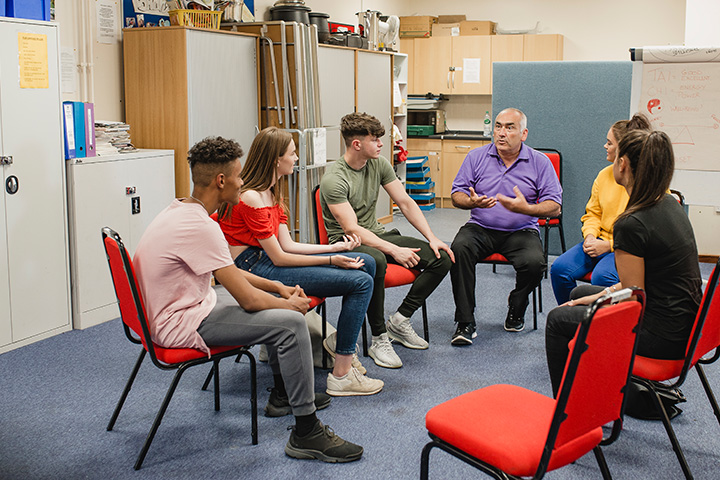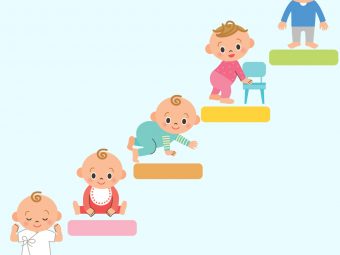
Adolescence brings several physical, physiological, emotional, and social changes in teens. Sometimes, these changes can be quite overwhelming and confusing, which is when parents should work on building confidence in teenagers.
Developing self-confidence is necessary to help teenagers achieve their goals, build better relationships, and become resilient to face challenges. Parents play a significant role in defining their children’s personalities. Their actions and words guide children toward the right path. Therefore, you should always be supportive toward your teenagers, show them respect, appreciate them, and encourage them to be optimistic.
Read this post to learn more about the importance of developing self-confidence in children and how you can help them achieve it.
What Is Self-Confidence?
Image: IStock
The confidence in oneself to acknowledge and trust one’s abilities and skills and have a sense of control in life is self-confidence (1). When a person is confident:
- It fosters their social skills and affects the way one acts in public.
- It reflects in the way one conducts themselves.
- It helps develop self-respect and strengthen their overall personality.
- It raises one’s happiness quotient
- It bolsters self-assurance that ultimately affects their decision-making skills and abilities.
Why Is Self-Confidence Necessary In Teenagers?
Image: IStock
Self-confidence gives a teenager the ability to face life, its challenges, uncertainty and even tackle disappointments, ups, and downs of life better (2).
- Self-confidence helps teenagers in realistic goal-setting and achieve their aspirations in life.
- It nurtures their self-worth and self-belief that paves the way for effective problem-solving.
- It encourages assertiveness that helps build better bonds and relations with peers, friends, and family, making them happy and mentally strong.
- It helps them make safe and well-thought decisions and avoid people and situations that may harm them in any way.
Besides these, such teens are more likely to be assertive, positive, and enthusiastic.
Chengeer Lee, a career coach and talent partner, shares his experiences as a teenager. He talks about how he decided to change his mindset and grow his confidence. He says, “Back in the days, I lacked confidence a lot, being a young green teenager, I was shying away from many opportunities that might have changed my life in many meaningful ways. I gain confidence by acquiring knowledge through experiencing things multiple times. Repetition is the key to excellence (i).”
Repetition was Lee’s way, let’s see how parents can help their teen children gain confidence.
 Research finds
Research findsSigns Of Low Self-Confidence In Teenagers
Recognizing the signs of low self-confidence is essential for parents and caregivers to offer appropriate support and encouragement, fostering the teenagers’ development (2) (3).
- Teens with low confidence may show reluctance to engage in different activities and events.
- They are likely to hold back in class discussions, possibly avoiding speaking up or participating actively.
- They are more likely to succumb to the influence of their peers.
- They expect failure or reduce their effort when faced with challenges, fearing the possibility of not succeeding.
- Those with low self-confidence might withdraw socially, leading to decreased interactions with friends and a reluctance to engage in social activities.
- They may encounter challenges in accepting both praise and criticism.
Parents’ Role In Increasing Teenagers’ Self-Confidence
Image: IStock
Of all people, parents are the most important when it comes to building self-confidence in teenagers. Your support in building confidence in teens can go a long way in molding their personality.
- Your actions and words impact your teenager the most.
- How you feel about them and how you make them feel about themselves directly affects their self-image and self-perception.
- The way you treat them also sets a benchmark about how others should treat your teenager.
10 Tips On How To Increase Self-Confidence In Teenagers
Teenage is when a child is molded into an adult. It is such a sensitive process that only the parents have the tools (such as patience, determination, and courage). So, here are some of the effective tips on increasing your teenager’s self-confidence (2) (4).
1. Show respect
Do not forget – your teenager is not a child anymore and is a near-adult, and as such, deserves respect just like any other adult.
- When you address your teenager, always show respect. Do not let disdain or contempt show in your tone!
- Always treat their problems and fears with importance. Never shun off your teenager’s fears as a childhood worry.
2. Praise often
You must often praise your teenager for their accomplishments. Be generous with your compliments.
- When you praise your teenager for something good they did, it boosts their confidence. In addition, it provides them ample motivation and encouragement to strive for even greater success in the future.
- Always express yourself and let them know how good and proud you feel to have them as your kid.
 Did you know?
Did you know?3. Avoid criticism
Try and avoid criticizing as much as you can. Criticism can be detrimental to your teenager’s self-confidence and negatively affect their growth mindset.
- If you disapprove or dislike something that involves your teen, take time to sit with them and talk it out.
- Teenagers often take criticism as ridicule or shame. But, at times, when criticism is unavoidable, watch your tone.
4. Encourage extra-curricular activities
Image: Shutterstock
Let your teenager follow his hobbies.
- Encourage them to participate in more and more activities. It is important for your teenager to excel at anything they like and enjoy.
- Extracurricular activities prove to be great opportunities for learning about success, failure, challenges and they add a great deal to your teenager’s confidence.
- Engaging in these activities can foster a positive team spirit in your teenager and promote their understanding of teamwork and leadership. It can ultimately result in their ability to collaborate effectively towards a shared objective.
- These activities also provide them opportunities to work on their creativity, time management, and communication skills.
5. Support optimistic friendships
We know you cannot possibly control, pick and choose the kind of friends your teenager will make. Teach them respect and acceptance, which is essential for social skills development.
- Mutual understanding and respect in any relationship are important. Teach your teen that value is what matters between friends.
- The kind of friends your teenager makes also affects their self-confidence. Teach them ways to differentiate between good and fair-weather friends.
6. Teach them that looks do not matter
Most teenagers fall under peer pressure. To them, looks matter a lot. They crave to look like models and celebs, and the inability to do so affects their self-confidence immensely.
- It is important to sit and explain to your teenager that looks do not matter.
- What matters is good manners, hygiene, self-care, and a healthy mind and body.
7. Focus on their strengths
Tell your teenager that they should focus more on strengths. Never compare your teenager to their peers, friends, siblings, and cousins.
- Your teen should realize how different people have different strengths. Comparison creates rivalry.
- Make your teenager understand that their only competition is with themselves. And the best way to do even better is to focus on strengths. Taking up mindfulness activities can help them.
Sharing her personal life experience, Youtuber Lana Blakely says, “I don’t strive to be super confident at all times in every situation during any circumstance if that’s even possible. Like most things I just want to feel balanced. And to get there it’s been valuable for me to understand when it is that I feel confident and why I might feel more confident during certain times compared to others and what are the contributing factors. So I’ve spent quite a bit of time reflecting on that and I’m pretty confident that I’m onto something here (ii).”
8. Teach them to be stronger
Teach your teenager to build some tolerance level or resilience towards teasing or heckling. Teasing affects a teenager’s self-confidence and self-image.
- A good rule in life is to grin and bear it. Your teenager must learn to tolerate negative emotions to some extent, without losing their cool. This is a part of enhancing their emotional intelligence.
- Your teenager must know that teasing cannot hurt, and it should in no way affect their self-confidence.
- Help them practice positive self-talk, which will help them develop self-confidence and self-assurance.
9. Look for professional help
Image: IStock
If your teenager suffers from a severe lack of confidence that has started to affect their academic and/or social life, you may need help from external sources.
- Initially, you can try family counseling with your teen’s favorite relatives.
- If the above does not work, it is best to seek professional help, which could help uncover the real issue behind this lacking and help your teenager come out of it.
10. Be your teenager’s support system
You probably don’t even realize how small gestures and the little things you say and do in regular life boost your teenager’s self-confidence. Your teenager must know that you are always there for them, no matter what.
- Your support can act as a catalyst as far as your teenager’s self-confidence is concerned.
- The moment your teenager knows they have someone to rely on, to fall back upon, they can face their life with even more confidence and strength.
 Point to consider
Point to considerFrequently Asked Questions
1. What causes a lack of confidence?
An unhappy childhood and poor academic performance can affect children’s confidence. Extreme criticism from teachers and parents and ongoing stress from life events can also impact self-confidence (5).
2. What are some qualities of those with high self-esteem?
People with high self-esteem feel worthy, respected, valued, and accepted by others. A person with high self-esteem can accept their mistakes and still believe in their competence even if they don’t succeed at first (6).
3. Is low self-confidence a mental health issue?
Low self-confidence or low self-esteem alone is not a mental health problem. However, it can be closely related to various mental health issues, including long-term mental health issues such as anxiety and depression, which can negatively affect a person’s self-esteem (7).
4. What causes low self-esteem in a child?
Childhood trauma such as emotional, physical, or sexual abuse, severe illness, disasters, and grief can cause low self-esteem in children. These unpleasant experiences make the child perceive that nothing around them is good (8).
5. What destroys a child’s confidence?
Poor parental strategies can destroy a child’s confidence in themselves. Letting them escape responsibility, being overprotective, preventing them from making mistakes, protecting them from emotions, poor communication skills, and condoning a victim mentality could negatively affect your child’s self-confidence. Expecting perfection and punishing rather than disciplining them for their mistakes can also destroy a child’s self-confidence (9).
6. How can teenagers learn to handle criticism and rejection?
Teach a teen to perceive criticism and rejection as stepping stones to success. Explain to them that each experience comes with a chance to learn and grow. Therefore, instead of being disheartened and cross, they must treat criticism and rejection as feedback that helps them improve their approach, taking them closer to their goals and aspirations.
7. What are some ways to help teenagers develop resilience?
Staying focused on the goal and not letting distractions cloud their judgment are some approaches to developing resilience in teens. Teach your teen to have an inner voice that cheers for them and motivates them when they feel low, keeping them strong in tough situations.
8. How can teenagers learn to embrace their strengths and weaknesses?
A teen must begin by accepting that both are part of their innate nature; that is how they are, and there is nothing wrong with it. Let your teen learn ways to leverage and use their strengths best, offsetting the limitations brought by weaknesses. Teens must learn that, ultimately, any weakness can be conquered through determination, concentration, and hard work.
The several physical, psychological, emotional, and hormonal changes of adolescence may take a toll on the self-confidence in teenagers. Self-confidence is an essential quality for teenagers as it helps them achieve success in their academics and helps them make friends and have a vibrant social life. Parents play a major role in building confidence in teenagers. Appreciating them, avoiding destructive criticism, teaching them the importance of inner beauty, focusing on their strengths, and providing professional help when needed are some of the many ways parents can help increase confidence in their teenagers.
Infographic: Activities To Increase Self-Confidence In Teenagers
As a teen, your child faces a lot of pressure and competition. So, it is natural for them to turn reserved and lose self-esteem. Check out the infographic below to learn about effective ways to increase your teen’s self-confidence. Save and share it with other parents too! Illustration: Momjunction Design Team
Key Pointers
- Treat your teenager with respect and give importance to their problems and fears.
- Boost their confidence by recognizing and praising their good deeds, and avoiding criticism.
- Encourage them to participate in activities they enjoy, which will build positive team spirit.
- Teach them the importance of mutual understanding, respect, and acceptance for healthy relationships.
Image: Dall·E/MomJunction Design Team
Learn how to build your teenager’s self-esteem the right way with these four simple steps. Discover how to help your teen feel confident and secure.
Personal Experience: Source
MomJunction articles include first-hand experiences to provide you with better insights through real-life narratives. Here are the sources of personal accounts referenced in this article.
i. How to get confidence.https://chengeer.medium.com/how-to-get-confidence-b6cb49671423
ii. How I became confident (my advice).
https://www.youtube.com/watch?v=CgDqB09KQDU
References
- What Is Self-Confidence?
https://www.usf.edu/student-affairs/counseling-center/top-concerns/what-is-self-confidence.aspx - Confidence in pre-teens and teenagers.
https://raisingchildren.net.au/pre-teens/development/social-emotional-development/confidence-in-teens - Signs of Low Self-Esteem in Children & Teens.
https://www.healthychildren.org/English/ages-stages/gradeschool/Pages/Signs-of-Low-Self-Esteem.aspx - How to build self-confidence in a teenager.
https://study.uq.edu.au/stories/how-boost-self-confidence-teenager - Self esteem.
https://www.betterhealth.vic.gov.au/health/healthyliving/self-esteem - Build Self-Esteem.
https://www.cdss.ca.gov/inforesources/foster-care/emotional-wellness/build-self-esteem - What Is Self-Esteem?.
https://www.mind.org.uk/information-support/types-of-mental-health-problems/self-esteem/about-self-esteem/ - Why the Causes of Low Self-Esteem May Be Rooted in Your Childhood.
https://compasscounseling.org/why-the-causes-of-low-self-esteem-may-be-rooted-childhood/ - A psychotherapist shares the 7 biggest parenting mistakes that destroy kids’ confidence and self-esteem.
https://www.cnbc.com/2019/09/06/7-parenting-mistakes-that-destroy-kids-confidence-and-self-esteem-according-to-a-psychotherapist.html - Unni K. Moksnes, Geir A. Espnes; (2012); Self-esteem and emotional health in adolescents – gender and age as potential moderators.
https://onlinelibrary.wiley.com/doi/10.1111/sjop.12021 - Encouraging good behavior in pre-teens and teenagers: 20 tips.
https://raisingchildren.net.au/pre-teens/behaviour/encouraging-good-behaviour/encouraging-good-behaviour-teens























